· Tara Price · Lifestyle
The Ultimate Countdown: The Best Sports Movies of All Time
![<p>Exploring the ultimate countdown of the best sports movies of all time reveals a fascinating journey through the heart and soul of athletic drama and inspiration. This list covers the emotional highs and lows of sports drama movies, featuring a variety of disciplines from boxing to baseball to soccer to basketball, demonstrating the universal appeal and […]</p>](/_image?href=https%3A%2F%2Fneonmusic.online%2Fwp-content%2Fuploads%2F2024%2F04%2F444-56.jpg&w=900&h=506&f=webp)
Exploring the ultimate countdown of the best sports movies of all time reveals a fascinating journey through the heart and soul of athletic drama and inspiration.
This list covers the emotional highs and lows of sports drama movies, featuring a variety of disciplines from boxing to baseball to soccer to basketball, demonstrating the universal appeal and varied narratives that make sports movies so captivating.
It’s not just about the adrenaline-fueled victories or the crushing defeats; it’s about the stories of perseverance, overcoming adversity, and the quest for greatness that resonate deeply with audiences worldwide.
Many of these films are sports movies based on true stories, adding an extra layer of authenticity and power to their storytelling.
As we dive into the reels of the best sports movies of all time, we meet characters who embody the spirit of their sport, antagonists who enrich the narrative with compelling conflict, and moments of cinematic brilliance that elevate the storytelling.
From the slow-motion triumphs to the “We Are No Longer Terrible” montages, these films tap into the essence of competitive spirit and individual excellence.
The inclusion of both blockbusters and documentaries, such as “The Iron Claw” and “Senna,” showcases the broad spectrum of storytelling that these movies encompass, providing a rich tapestry of inspirational sports drama movies that continue to inspire and entertain.
Each title in this collection not only celebrates the physical feats but also the emotional journey, making them a beacon for anyone who cherishes the art of cinema and the drama of sports.
The list includes popular sports movies that have left an indelible mark on the genre, as well as new sports movies like “Air (2023)” that continue to push the boundaries of sports cinema.
Raging Bull (1980)
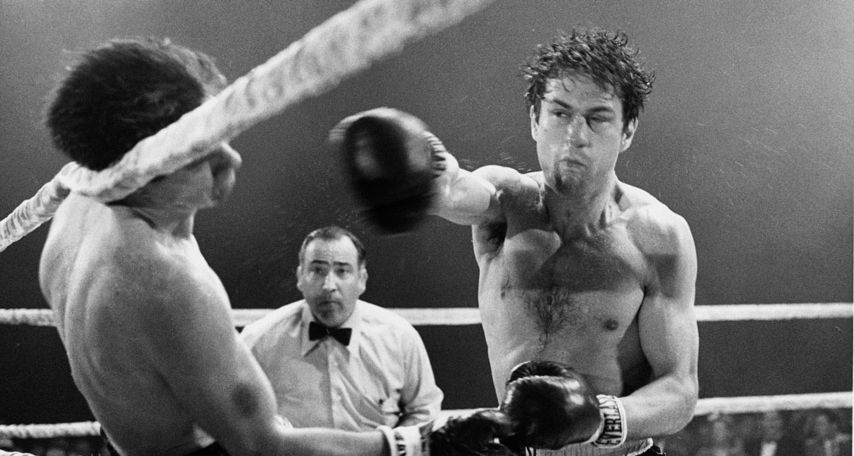
Overview and Impact
“Raging Bull,” directed by Martin Scorsese, is a biographical sports drama that delves into the complex life of Jake LaMotta, a middleweight boxer, showcasing his rise and tumultuous fall within the boxing world.
Based on LaMotta’s autobiography, “Raging Bull: My Story,” the 1980 film stars Robert De Niro, who won an Academy Award for Best Actor for his compelling portrayal of LaMotta.
The narrative captures LaMotta’s volatile relationships with his brother Joey and wife Vickie, adding depth to the personal battles he faced outside the ring.
Critical Reception and Achievements
Upon its release, “Raging Bull” received mixed reviews but has since been reevaluated by critics and is now revered as one of the greatest films ever made.
It was nominated for eight Academy Awards, including Best Picture and Best Director, and won two: Best Actor for De Niro and Best Editing.
The film’s significant cultural, historical, and aesthetic contributions were recognised when it was selected for preservation in the United States National Film Registry by the Library of Congress in its first year of eligibility.
Production Insights
The production of “Raging Bull” was a meticulous process, with each boxing scene choreographed to achieve a specific visual style, reflecting Scorsese’s detailed direction.
Robert De Niro’s dedication to the role was evident as he gained approximately 60 pounds to portray LaMotta in his later years, a physical transformation that further solidified his commitment to the character.
The film, with a budget of $18 million, grossed $23.4 million at the box office, underscoring its commercial success alongside its critical acclaim.
Rocky (1976)
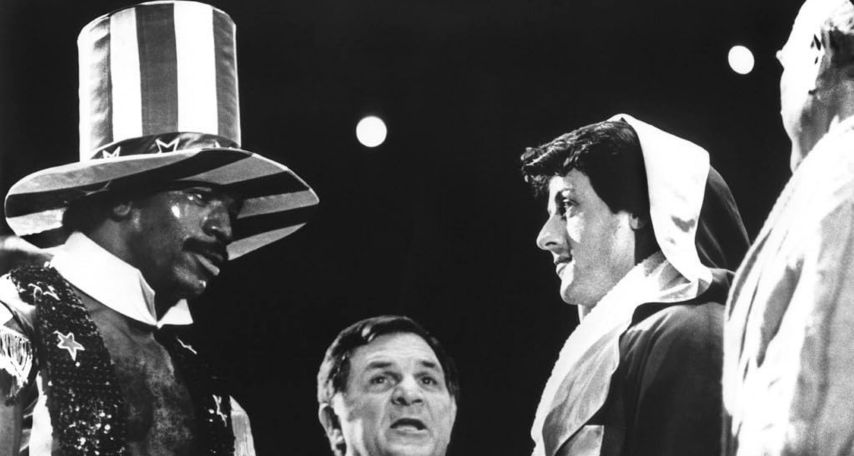
“Rocky,” released in 1976, is celebrated as a quintessential sports film that epitomises the American Dream through its compelling rags-to-riches narrative.
Sylvester Stallone’s portrayal of Rocky Balboa, a small-time boxer who gets a shot at the heavyweight championship, resonated deeply with audiences, earning the film an Academy Award for Best Picture.
Its depiction of personal and athletic struggle, alongside themes of perseverance and self-belief, has established “Rocky” as a monumental film in the sports genre, influencing countless other movies.
The movie also broke new ground technically with its pioneering use of the Steadicam, enhancing the dynamic filming of boxing scenes and contributing significantly to film-making techniques across all genres.
This innovation not only added to the film’s visceral appeal but also set a new standard for the realistic portrayal of sports in cinema.
Beyond its technical achievements and narrative impact, “Rocky” has served as a valuable educational tool, discussed in the sociology of sport classes for its exploration of social issues such as race, gender, and economic stratification.
This educational aspect underscores the film’s layered contributions to both cinema and society, making it a staple in discussions about the cultural and social impact of sports in film.
The Wrestler (2008)

Overview and Impact
Directed by Darren Aronofsky and penned by Robert Siegel, “The Wrestler” features Mickey Rourke as Randy “The Ram” Robinson, an ageing wrestler struggling to keep his career alive while dealing with personal dilemmas.
The film garnered critical acclaim, securing the prestigious Golden Lion Award at the 65th Venice International Film Festival and receiving nominations for two Academy Awards, including Best Actor for Mickey Rourke and Best Supporting Actress for Marisa Tomei.
It strikingly portrays Randy’s efforts to reconcile with his estranged daughter and build a romantic relationship with a woman who works as a stripper, adding layers to the narrative.
Production and Reception
“The Wrestler” was produced on a modest budget of $6 million and achieved significant box office success, grossing $44.7 million.
The production involved companies like Wild Bunch and Protozoa Pictures, with distribution managed by Fox Searchlight Pictures in the United States and Wild Bunch internationally.
The film’s authentic depiction of the wrestling world was appreciated within the industry, with figures like Roddy Piper commending its realistic portrayal.
Its documentary-style approach was enhanced by the inclusion of real independent wrestling shows and performers, which contributed to the film’s gritty aesthetic.
Memorable Aspects and Cultural Impact
Clint Mansell’s composition, along with a soundtrack featuring glam metal acts such as Ratt, provided a fitting musical backdrop for the film’s intense themes.
A notable promotional tactic was an on-screen angle with WWE, initially announcing Mickey Rourke to compete at WrestleMania 25, although he ultimately appeared only as a guest.
The film’s raw depiction of the wrestling industry highlights the relentless pursuit of acceptance and the harsh realities faced by performers, with a particularly memorable mid-movie bloodbath scene underscoring Randy’s desperation to revive his career.
Ali (2001)
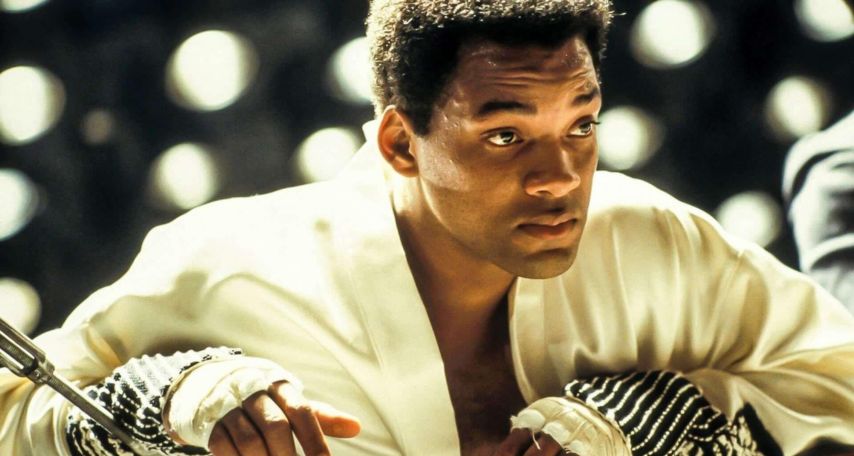
Directed by Michael Mann, “Ali” is a biographical sports drama that captures a decade in the life of Muhammad Ali, portrayed by Will Smith, from 1964 to 1974.
The film delves into Ali’s significant heavyweight title wins, his conversion to Islam, and his stance on social and political issues during a tumultuous period in American history.
Released on Christmas Day in 2001, “Ali” had a substantial budget between $107 and $118 million but garnered a worldwide gross of $87.7 million.
The screenplay, crafted by Michael Mann, Eric Roth, Stephen J. Rivele, and Christopher Wilkinson, with a story by Gregory Allen Howard, explores pivotal moments such as Ali’s refusal to serve in the Vietnam War and his iconic fight with George Foreman in “Rumble in the Jungle.”
Despite mixed reviews, Will Smith’s portrayal of Ali was universally acclaimed, earning him an Academy Award nomination for Best Actor.
The film also saw Jon Voight nominated for his supporting role.
“Ali” is available across various streaming platforms and was released on DVD and VHS in 2002, allowing a wider audience to access this cinematic portrayal of one of sports’ most legendary figures.
When We Were Kings (1996)
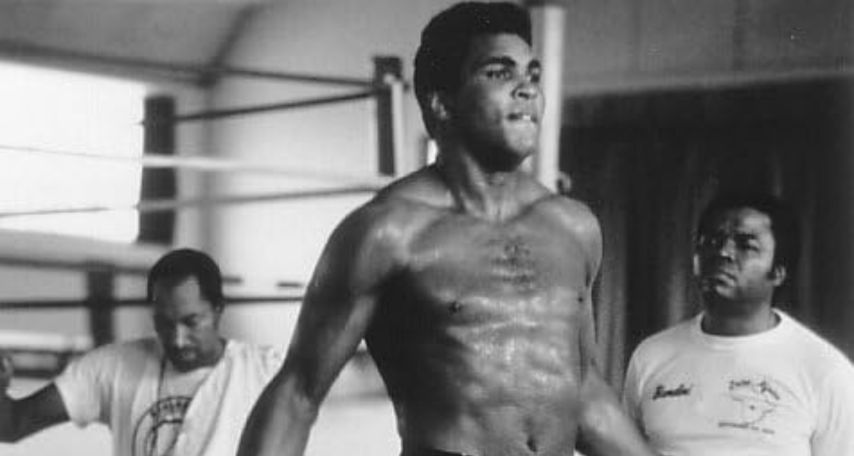
Overview and Impact
“When We Were Kings,” directed by Leon Gast, captures the iconic 1974 heavyweight championship bout, known as the “Rumble in the Jungle,” between Muhammad Ali and George Foreman in Zaire.
This documentary not only focuses on the event itself but also delves into the profound cultural and political implications surrounding it.
The fight, originally tied to the Zaïre 74 music festival, was rescheduled due to Foreman’s injury, adding to the anticipation and historical significance of the event.
Ali’s victory, utilising the strategic rope-a-dope technique against the younger Foreman, is depicted as not only a sports achievement but also a powerful symbol of resilience and black pride.
Cultural and Historical Context
The documentary explores the complex layers of black identity and the political landscape of Zaire under Mobutu Sese Seko, who used the event to promote a pan-African identity.
The inclusion of prominent figures like James Brown and B.B. King in the accompanying music festival further enriched the cultural resonance of the event.
The film portrays Ali not just as a boxer but as a charismatic leader whose pre-fight antics and philosophical insights captivated the global audience.
This portrayal is supported by interviews with celebrities and journalists who provide colourful and insightful commentary, enhancing the narrative woven by Gast.
Technical and Artistic Merit
The documentary’s editing, handled by Gast along with Taylor Hackford and others, employs a dynamic style reminiscent of Soviet Montage, creating a compelling narrative through its visual and auditory elements.
The film’s ability to intertwine the excitement of the boxing match with the cultural and political drama unfolding makes it a standout in sports documentaries, earning it the Academy Award for Best Documentary Feature in 1996.
The vibrant backdrop of Zaire, combined with the intense personal and physical stakes of the fight, creates a documentary that remains relevant and powerful decades after its release.
Hoop Dreams (1994)
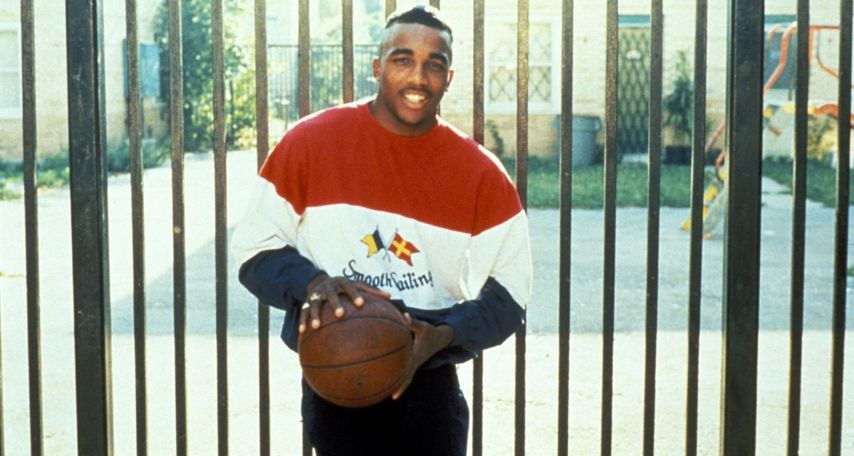
“Hoop Dreams,” a documentary released in 1994, directed by Steve James, Frederick Marx, and Peter Gilbert, follows the lives of two black teenagers, Arthur Agee and William Gates, as they navigate the complex path towards their NBA aspirations.
The film, acclaimed for its deep narrative and emotional engagement, grossed $7 million, underscoring the commercial viability of documentaries.
It was pivotal in demonstrating that documentaries could perform well at the box office, setting a precedent for future films.
The production techniques of “Hoop Dreams” also had a significant impact on the industry.
It was among the first feature films to be shot on video, which reduced production costs and allowed for a longer shooting schedule.
This approach has since become a standard in documentary filmmaking, influencing a generation of filmmakers, including Bing Liu, who have embraced its empathetic lens and commitment to its subjects.
Furthermore, the film has been incorporated into educational curricula across various disciplines, from economics to sports marketing, highlighting its multidimensional impact.
It not only explores the aspirations and challenges faced by its protagonists but also provides a critical commentary on the socio-economic and cultural dynamics that influence their journeys.
The documentary’s portrayal of its subjects has sparked broader discussions on race, opportunity, and the American dream, resonating with audiences and critics alike.
Moneyball (2011)
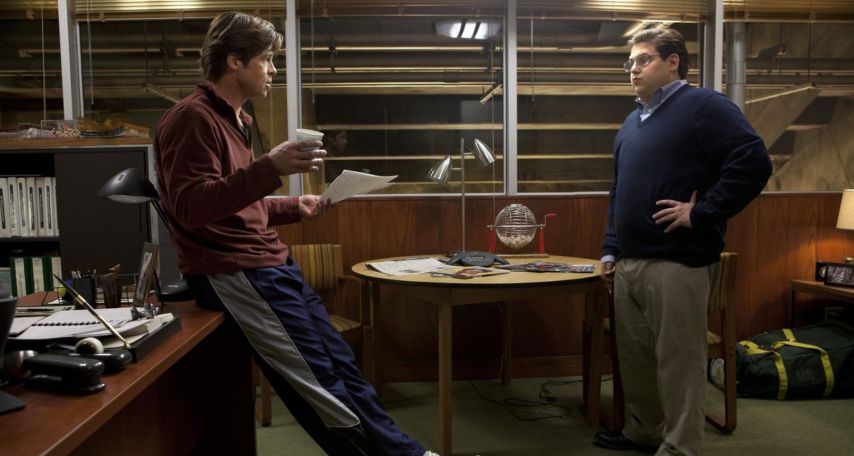
Overview and Impact
“Moneyball,” directed by Bennett Miller, is a sports drama that revolutionised the portrayal of baseball on the big screen. It tells the story of Billy Beane, the general manager of the Oakland Athletics, who challenged traditional scouting methods by employing sabermetrics to assemble a competitive team.
Critical Reception and Achievements
The film was a critical success, earning six Academy Award nominations, including Best Picture, Best Actor for Brad Pitt, and Best Supporting Actor for Jonah Hill. It also received widespread acclaim for its innovative approach to the sports genre.
Production Insights
With a budget of $50 million, “Moneyball” grossed over $110 million worldwide.
The film’s realistic depiction of baseball strategy and its impact on the game’s economics brought a new level of depth to sports cinema.
Jerry Maguire (1996)
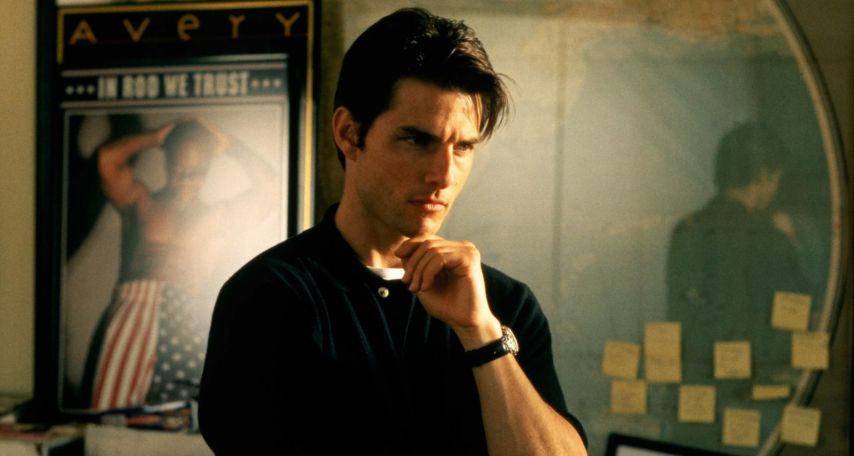
Overview and Impact
“Jerry Maguire,” directed by Cameron Crowe, is a sports agent drama that delves into the ethical dilemmas and personal growth of its titular character, played by Tom Cruise.
The film is known for its iconic lines and the heartfelt relationship between Maguire and his client, Rod Tidwell.
Critical Reception and Achievements
The movie was a box office hit and critically acclaimed, earning five Academy Award nominations and winning Best Supporting Actor for Cuba Gooding Jr.
Production Insights
With memorable performances and a compelling narrative, “Jerry Maguire” grossed over $273 million and remains a beloved classic in the sports film genre.
Air (2023)
Overview and Impact
“Air,” a recent addition to the sports film landscape, captures the essence of basketball culture and its influence on society.
The film explores the rise of the sport and its global impact, showcasing the power of athletic inspiration.
Critical Reception and Achievements
As a contemporary release, “Air” has been praised for its dynamic storytelling and engaging portrayal of basketball’s significance.
Production Insights
The film’s production brought together a talented cast and crew, creating a vibrant depiction of the sport that resonates with modern audiences.
Any Given Sunday (1999)
Overview and Impact
Directed by Oliver Stone, “Any Given Sunday” offers a gritty look at the professional football world, highlighting the struggles and triumphs of players and coaches.
The film is known for its intense game sequences and powerful performances.
Critical Reception and Achievements
The movie received positive reviews for its realistic portrayal of the sport and its impact on the characters’ lives.
Production Insights
With a star-studded cast and a compelling script, “Any Given Sunday” achieved both critical and commercial success, cementing its place in the sports movie canon.
The Fighter (2010)
Overview and Impact
“The Fighter,” directed by David O. Russell, is a gripping biographical drama centred around the lives of professional boxer Micky Ward and his half-brother Dicky Eklund.
The film explores their tumultuous relationship, Micky’s boxing career, and the challenges they face within their family.
Critical Reception and Achievements
The movie received widespread acclaim for its authentic portrayal of the boxing world and the performances of its cast. Christian Bale’s transformation into Dicky Eklund earned him an Academy Award for Best Supporting Actor.
Production Insights
The film’s production emphasised realism, with intense training sessions for Mark Wahlberg (Micky Ward) and Bale (Dicky Eklund).
The gritty boxing scenes and emotional family dynamics contribute to its impact.
He Got Game (1998)
Overview and Impact
Spike Lee’s “He Got Game” delves into the world of college basketball recruiting and the pressures faced by young athletes.
Denzel Washington stars as Jake Shuttlesworth, a father seeking redemption while navigating the complexities of his son’s future.
Critical Reception and Achievements
The film received praise for its thought-provoking themes, including the exploitation of student-athletes and the sacrifices made for success.
Ray Allen’s performance as Jesus Shuttlesworth, a high school basketball prodigy, adds authenticity.
Production Insights
“He Got Game” captures the intensity of basketball courts and the emotional stakes involved in the game.
Its soundtrack, featuring Public Enemy’s iconic track “He Got Game,” further elevates the film.
Rush (2013)
Overview and Impact
Directed by Ron Howard, “Rush” chronicles the intense rivalry between Formula 1 drivers James Hunt (played by Chris Hemsworth) and Niki Lauda (portrayed by Daniel Brühl).
The film captures the adrenaline-fueled world of racing and the personal battles faced by these competitors.
Critical Reception and Achievements
“Rush” received acclaim for its thrilling race sequences, character development, and the chemistry between Hemsworth and Brühl.
The film’s authenticity in recreating the 1970s F1 era resonated with both racing enthusiasts and general audiences.
Production Insights
The meticulous attention to detail, from vintage cars to period costumes, immerses viewers in the high-speed drama.
The contrasting personalities of Hunt and Lauda provide a captivating narrative.
Warrior (2011)
Overview and Impact
Gavin O’Connor’s “Warrior” combines the intensity of mixed martial arts (MMA) with a powerful family drama.
The film follows two estranged brothers, played by Tom Hardy and Joel Edgerton, as they enter a high-stakes MMA tournament.
Critical Reception and Achievements
“Warrior” received praise for its raw emotion, realistic fight choreography, and the performances of its leads.
The film’s exploration of redemption, forgiveness, and brotherhood resonated with audiences.
Production Insights
The physical training undertaken by Hardy and Edgerton to portray MMA fighters contributed to the film’s authenticity. The climactic tournament scenes are both brutal and emotionally charged.
Creed (2015)
Overview and Impact
“Creed,” directed by Ryan Coogler, is a powerful addition to the “Rocky” franchise.
The film introduces Adonis Creed (played by Michael B. Jordan), the son of Apollo Creed, as he seeks to follow in his father’s footsteps and become a professional boxer.
Critical Reception and Achievements
“Creed” received acclaim for its fresh take on the boxing genre, blending nostalgia with a contemporary narrative. Sylvester Stallone reprised his role as Rocky Balboa, earning an Academy Award nomination for Best Supporting Actor.
Production Insights
The film’s training montages pay homage to the original “Rocky” series while infusing them with a modern flair.
The emotional connection between Adonis and Rocky resonates with both longtime fans and new audiences.
Million Dollar Baby (2004)
Overview and Impact
Directed by Clint Eastwood, “Million Dollar Baby” is a poignant drama that explores the relationship between a determined female boxer, Maggie Fitzgerald (Hilary Swank), and her grizzled trainer, Frankie Dunn (Eastwood).
Critical Reception and Achievements
The film received widespread acclaim for its performances, particularly Swank’s portrayal of Maggie. It won four Academy Awards, including Best Picture, Best Director, Best Actress, and Best Supporting Actor (Morgan Freeman).
Production Insights
“Million Dollar Baby” masterfully balances the physical demands of boxing with the emotional weight of personal connections. Its heartbreaking climax leaves a lasting impact on viewers.
The Color of Money (1986)
Overview and Impact
Directed by Martin Scorsese, “The Color of Money” is a sports drama that revisits the character of Fast Eddie Felson (played by Paul Newman) from the classic film “The Hustler.”
This time, Eddie mentors a young pool player, Vincent Lauria (Tom Cruise).
Critical Reception and Achievements
The film received positive reviews, with Newman earning an Academy Award for Best Actor. Scorsese’s direction captures the intensity of high-stakes pool games and the mentor-protégé dynamic.
Production Insights
The chemistry between Newman and Cruise adds depth to the film, and the pool sequences are meticulously choreographed.
“The Color of Money” serves as both a sequel and a standalone exploration of the sport.
Friday Night Lights (2004)
Overview and Impact
Based on the book by H.G. Bissinger, “Friday Night Lights” (directed by Peter Berg) brings the world of Texas high school football to the screen.
The film follows the Permian High School Panthers as they strive for victory amidst immense pressure.
Critical Reception and Achievements
The movie received praise for its authentic portrayal of small-town football culture and the emotional toll it takes on players, coaches, and the community.
The ensemble cast delivers compelling performances.
Production Insights
“Friday Night Lights” captures the fervour of Friday night games under the stadium lights. The film’s depiction of the players’ dreams, sacrifices, and camaraderie resonates with audiences beyond the football field.
White Men Can’t Jump (1992)
Overview and Impact
“White Men Can’t Jump,” directed by Ron Shelton, combines basketball, hustling, and humour.
The film follows two street basketball players, Billy Hoyle (Woody Harrelson) and Sidney Deane (Wesley Snipes), as they team up to hustle opponents on the courts of Los Angeles.
Critical Reception and Achievements
The movie blends sports action with witty banter, showcasing the chemistry between Harrelson and Snipes. It became a cult classic and remains a favourite among basketball enthusiasts.
Production Insights
The film captures the vibrant street basketball scene, emphasising the art of trash-talking and the hustle. Its portrayal of the game’s subculture adds depth to the comedy.
Days of Thunder (1990)
Overview and Impact
Directed by Tony Scott, “Days of Thunder” takes viewers into the high-speed world of NASCAR racing.
Tom Cruise stars as Cole Trickle, a hotshot driver aiming for victory while navigating rivalries, crashes, and personal demons.
Critical Reception and Achievements
The film received mixed reviews but found success at the box office. Its adrenaline-pumping race sequences and Cruise’s charisma contributed to its enduring appeal.
Production Insights
“Days of Thunder” immersed audiences in the sights and sounds of stock car racing. The collaboration between Cruise and Scott resulted in a visually dynamic experience.
Conclusion
Throughout this exploration of the best sports movies of all time, we’ve delved into the narratives that transcend mere athletic competition to touch the core of human experience—perseverance, resilience, and the indomitable spirit of the underdog.
Each film, from the raw power of “Raging Bull” to the inspirational journey of “Rocky” and the poignant storytelling of “Hoop Dreams,” serves as a testament to the depth and diversity of sports cinema.
These movies do not simply capture the essence of the sports they depict but also offer insights into the complexities of ambition, failure, and triumph, making them timeless in their appeal and impact.
The significance of these films extends beyond their immediate narrative to influence culture, education, and cinema itself, offering a lens through which we can examine broader social issues and personal narratives.
By capturing the human struggle through the lens of sports, these movies offer not just entertainment but a source of motivation and reflection for audiences around the world.
In recognising their artistic and emotional contributions, we acknowledge the power of storytelling in sports and the enduring legacy these films leave for future generations to draw upon.
You might also like:
- The Inspirational True Story of The Boys in the Boat Brought to Life on the Big Screen
- The Best Sci-Fi Movies on Amazon Prime Video
- The Ultimate Guide to the Best Movies on Amazon Prime
- The Intricate World of Sicario: A Deep Dive into the Series
FAQs
1. What are some of the top sports movies ever made?
Some of the most acclaimed sports movies include ‘When We Were Kings’ (1996), ‘Slap Shot’ (1977), ‘Bull Durham’ (1988), ‘Caddyshack’ (1980), ‘Raging Bull’ (1980), ‘The Bad News Bears’ (1976), ‘Rocky’ (1976), and ‘Hoop Dreams’ (1994). These films are celebrated for their portrayal of sports and the human spirit.
2. Which sports movie based on a true story is highly recommended?
‘The Blind Side’ (2009) is highly recommended. It tells the true story of Michael Oher, a homeless teenager who becomes an NFL player with the support of Leigh Anne Tuohy, played by Sandra Bullock. Bullock’s performance won her the Best Actress Oscar.
3. Can you suggest some favourite movies about sports?
Some personal favourites in sports-related movies include ‘We are Marshall’, ‘Remember the Titans’, and ‘Moneyball’. Each of these films offers a compelling look at various aspects of sports and is highly recommended for its storytelling and emotional impact.
4. Is ‘Rocky’ considered the greatest sports movie of all time?
While ‘Rocky’ (1976) is often ranked highly among sports movies, it is not universally considered the greatest. Other notable films include ‘The Hustler’ (1961), ‘The Wrestler’ (2008), ‘Raging Bull’ (1980), ‘Hoop Dreams’ (1994), ‘The Pride of the Yankees’ (1942), and ‘Million Dollar Baby’ (2004), all of which are also highly regarded in the sports genre.








